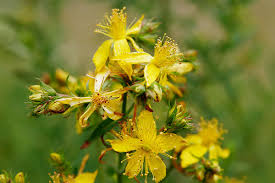St. John’s wort, properly called Hypericum perforatum, is generally considered a weed by gardeners, but it has been used by herbalists for its medicinal properties for hundreds of years. It is particularly known for its antidepressant qualities, but it may have other benefits too.

As an Antidepressant
One of the most common and well-researched uses of St. John’s wort is as an antidepressant. Compounds such as hypericin and hyperforin that are found inside the plant may impact your brain and mood. It is generally more effective when the depression is mild or moderate than if it is severe.
For a Wide Range of Other Conditions
People do not just use St. John’s wort to treat depression. It has also been used to alleviate the symptoms of anxiety, premenstrual tension, menopause and withdrawal when attempting to quit addictive substances such as cigarettes and alcohol.
As well as its impact on the brain and mood, it may influence your hormone levels, have anti-inflammatory properties and speed up wound healing when used topically. There is even a suggestion that it may work as an antiviral.
Low Risk of Side Effects
Not everyone can take St. John’s wort (it can aggravate psychosis in people with schizophrenia and similar conditions). However, it is significantly less likely to cause major side effects than many conventional antidepressant medications. This means people are less likely to stop taking it. Mental health training courses such as those at www.tidaltraining.co.uk/mental-health-training-courses can help you identify the benefits and risks of different treatments.

It is supported by evidence
Many complementary or alternative medicines are based on dubious scientific claims, but there is extensive research supporting the effectiveness of St. John’s wort as a treatment for depression in particular. It is important to remember that it can interact badly with other medications or conditions, so consult with your doctor first.
Individual reactions to St. John’s wort may vary, but evidence does suggest that many people, particularly those with mild or moderate depression, may find it beneficial. Always discuss new supplements with your doctor first in case of side effects or contraindications.



Leave a Reply